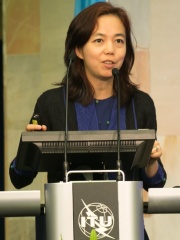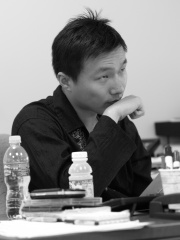


The Most Famous
COMPUTER SCIENTISTS from China
This page contains a list of the greatest Chinese Computer Scientists. The pantheon dataset contains 245 Computer Scientists, 3 of which were born in China. This makes China the birth place of the 16th most number of Computer Scientists behind Switzerland, and Sweden.
Top 3
The following people are considered by Pantheon to be the most legendary Chinese Computer Scientists of all time. This list of famous Chinese Computer Scientists is sorted by HPI (Historical Popularity Index), a metric that aggregates information on a biography's online popularity.

1. Liu Gang (b. 1961)
With an HPI of 53.11, Liu Gang is the most famous Chinese Computer Scientist. His biography has been translated into 54 different languages on wikipedia.
Liu Gang (Chinese: 刘刚; born 30 January 1961) is a Chinese-born American aerospace engineer, computer scientist, optical physicist, political activist, and writer. He founded the Beijing Students' Autonomous Federation. He was a prominent student leader at the Tiananmen Square protests of 1989. Liu holds an M.A. in physics from Peking University and an M.A. in computer science from Columbia University. After his exile to the United States in 1996, Liu studied technology and physics at Bell Labs in New Jersey. Liu was employed at Morgan Stanley as a Wall Street IT analyst.

2. Fei-Fei Li (b. 1976)
With an HPI of 49.49, Fei-Fei Li is the 2nd most famous Chinese Computer Scientist. Her biography has been translated into 27 different languages.
Fei-Fei Li (Chinese: 李飞飞; pinyin: Lǐ Fēifēi; born July 3, 1976) is a Chinese-born American computer scientist best known for establishing ImageNet, the dataset that enabled rapid advances in computer vision in the 2010s. She is the Sequoia Capital professor of computer science at Stanford University, with research expertise in artificial intelligence, machine learning, deep learning, computer vision, and cognitive neuroscience. Li is a co-director of the Stanford Institute for Human-Centered Artificial Intelligence and a co-director of the Stanford Vision and Learning Lab, and served as Chief Scientist of AI/ML at Google Cloud and the director of the Stanford Artificial Intelligence Laboratory from 2013 to 2018. In 2017, she co-founded AI4ALL, a nonprofit organization working to increase diversity in the field of artificial intelligence. In 2023, Li was named one of the Time 100 AI Most Influential People. Li received the Intel Lifetime Achievements Innovation Award in 2017 for her contributions to artificial intelligence, and was elected member of the National Academy of Engineering, the National Academy of Medicine in 2020 and the American Academy of Arts and Sciences in 2021. In 2025, she was named as one of the "Architects of AI" for Time's Person of the Year. On August 3, 2023, Li was appointed to the United Nations Scientific Advisory Board, established by Secretary-General Antonio Guterres. In 2024, Li was included on the Gold House's most influential Asian A100 list. In 2024, she raised $230 million for a startup called World Labs, which she and three colleagues founded to develop a "spatial intelligence" AI technology that can understand how the three-dimensional physical world works.

3. Jenova Chen (b. 1981)
With an HPI of 42.86, Jenova Chen is the 3rd most famous Chinese Computer Scientist. His biography has been translated into 16 different languages.
Xinghan Chen (Chinese: 陈星汉; pinyin: Chén Xīnghàn; born October 8, 1981), known professionally as Jenova Chen, is a Chinese video game designer. He is the designer of the award-winning games Cloud, Flow, Flower, and Journey, co-founder of Thatgamecompany as well as an advisor for Annapurna Interactive. Chen is from Shanghai, where he earned a bachelor's degree in computer science with a minor in digital art and design. He moved to the United States, where he earned a master's degree from the University of Southern California's Interactive Media Division. While there he created Cloud and Flow, and met fellow student Kellee Santiago. After a brief period at Maxis working on Spore, he founded Thatgamecompany with Santiago and became the company's creative director. The company signed a three-game deal with Sony Computer Entertainment, and has sold Flow, Flower, and Journey through the PlayStation Network. As Chen was born in a culture other than the culture he lives in, he tries to make games that appeal universally to all people. His goal with his games is to help video games mature as a medium by making games that inspire emotional responses in the player that other games are lacking. Although he and Thatgamecompany can and have made more traditional games, he does not plan on commercially developing any of them, as he does not think that it fits with their goals as an independent video game developer.
People
Pantheon has 3 people classified as Chinese computer scientists born between 1961 and 1981. Of these 3, 3 (100.00%) of them are still alive today. The most famous living Chinese computer scientists include Liu Gang, Fei-Fei Li, and Jenova Chen.
Living Chinese Computer Scientists
Go to all RankingsLiu Gang
1961 - Present
HPI: 53.11
Fei-Fei Li
1976 - Present
HPI: 49.49
Jenova Chen
1981 - Present
HPI: 42.86

